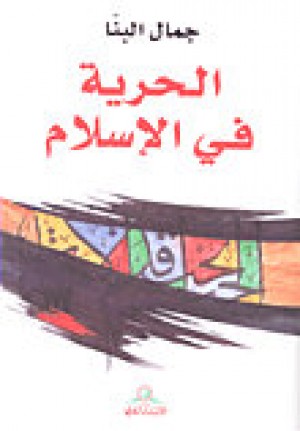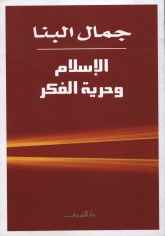Gamal Albanna 1920-2013
Gamal el-Banna's book "Islam and Freedom of Thought" was our book club selection for November 2009.
Find more information on the author and his work through the book's page.
Who is Gamal El-Banna?
source:Egypt Today - January 2005
Although his brother is hailed as the founder of political Islam and considered a strong believer in dogma, Gamal El-Banna holds very liberal views on the same faith
“I WAS THE total opposite of my brother the martyr, Mr. Hassan El-Banna,” says Gamal, who insists on referring to his brother as “Mr.” just as he was taught at school. Gamal was born in 1920 in the province of Beheira, 140 km west of Cairo. He was fourteen years younger than his brother Hassan, who received a religious education from his early years until he graduated from Dar al-‘ulum. Gamal, on the other hand, went through a secular education until he dropped out of high school, “with no regret,” after arguing with his English teacher. Later on, he studied commerce at an intermediate school until he received a diploma.
“Unfortunately, I didn’t go to a kuttab to memorize the Qur’an. I find it hard now to memorize the holy text,” says Gamal.
At the age of 17, he started reading about Islamic history and soon moved on to Islamic jurisprudence. El-Banna claims he’s been reading the different texts interpreting the Qur’an, the major compilations of hadith and various jurists’ works for over 50 years.
El-Banna published his first book on social reform titled Three Obstacles on the Road to Glory, at the age of 25. In 1946, he published another book entitled New Democracy, in which he criticized the Muslim Brotherhood’s discourse.
“Our house was across the street from the office of the organization [the Muslim Brotherhood] and I used to stand on the balcony and listen to the Brothers’ weekly lesson,” says El-Banna, adding that he always questioned the pragmatism of their motto: “God is our objective, the Prophet (PBUH) is our leader and the Qur’an is our constitution.” But that didn’t stop him from working at one of the Brotherhood’s secret print houses in the 1940s where leaflets calling for the protection of Palestine against Zionists were published. He was jailed after the ban of the organization in the late 1940s.
After the outbreak of the 1952 revolution, his book Rationalization of Renaissance was banned because it dubbed Nasser’s revolution a “coup d’état.” Due to the hostility of Nasser’s regime toward Islamists, El-Banna refrained from publishing Islamic works and focused on the syndicate movement in Egypt, at the same time working as a freelance translator for the International Labor Organization.
Sadat’s apparent leniency toward Islamists encouraged El-Banna to resume his Islam-oriented works. He published books such as The Book and the Sunnah: The Great Two Fundamentals and The Spirit of Islam.
In 1990, he started working on his trilogy Towards New Islamic Jurisprudence, calling for the revision of the basis of Islamic fiqh (Islamic jurisprudence) set by traditional Islamic scholars.
Later on, he started up the Fawziyya and Gamal El-Banna Foundation for Islamic Culture and Information. Upon her return from Saudi Arabia, his sister Fawziyya donated most of the money she’d earned working as a teacher in the Gulf to promote Islamic culture through the establishment of this project. The center, established in Gamal’s modest Bab El-Shaereya apartment, houses an Islamic library which contains thousands of Arabic and English texts.
One of Gamal’s most controversial works is The Veil, where he challenges the Islamic dogma obligating women to wear headscarves. He also published The Responsibility for the Failure of the Islamic State which was recently banned due to its refutation of the Sunni dogma prohibiting mutaa’ or temporary marriage for Muslim expatriates in non-Islamic countries.
Gamal, who considers the call for the renewal of Islamic thought on the basis of the Qur’an and the Sunnah as his mission in life, is expected to release his latest work The Renewal of Islam this month. The book, which he qualifies as a “bombshell”, dismisses the four Islamic madhahib (schools of law), which are elevated by Muslim scholars to canonical ranks. “This system [schools of jurisprudence] was set up after the Islamic polity was turned into an empire. The jurists made laws that emanated from the needs of that epoch and not from the spirit of Qur’an or the guidelines set by the Prophet (PBUH) in Medina. The divine text was interpreted in a way that would serve the status quo and maintain man’s superiority over women,” says Gamal.
But at Al-Azhar, many scholars consider the likes of Gamal El-Banna unqualified to tackle religious issues as they have not received the appropriate jurist education. In the meantime, many prominent Islamic thinkers dismiss him as a “nobody.”
“This is very subjective. They should not judge my qualifications but my thoughts,” Gamal retaliates. “The Qur’an condones freedom of thoughts in several verses. I want them to reply to what I am saying. Certificates are useless. They only help one get a job and earn a living. Thousands of people graduate from Al-Azhar every year, but none of them added anything new to Islamic thinking except for Mohamed Abdo.






